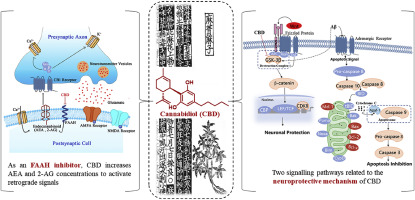当前位置:
X-MOL 学术
›
Eur. J. Med. Chem.
›
论文详情
Our official English website, www.x-mol.net, welcomes your feedback! (Note: you will need to create a separate account there.)
Overview of cannabidiol (CBD) and its analogues: Structures, biological activities, and neuroprotective mechanisms in epilepsy and Alzheimer's disease.
European Journal of Medicinal Chemistry ( IF 6.7 ) Pub Date : 2020-02-22 , DOI: 10.1016/j.ejmech.2020.112163 Han Li 1 , Yuzhi Liu 1 , Danni Tian 1 , Lei Tian 1 , Xingke Ju 1 , Liang Qi 1 , Yongbo Wang 1 , Chengyuan Liang 1
European Journal of Medicinal Chemistry ( IF 6.7 ) Pub Date : 2020-02-22 , DOI: 10.1016/j.ejmech.2020.112163 Han Li 1 , Yuzhi Liu 1 , Danni Tian 1 , Lei Tian 1 , Xingke Ju 1 , Liang Qi 1 , Yongbo Wang 1 , Chengyuan Liang 1
Affiliation

|
Herein, 11 general types of natural cannabinoids from Cannabis sativa as well as 50 (-)-CBD analogues with therapeutic potential were described. The underlying molecular mechanisms of CBD as a therapeutic candidate for epilepsy and neurodegenerative diseases were comprehensively clarified. CBD indirectly acts as an endogenous cannabinoid receptor agonist to exert its neuroprotective effects. CBD also promotes neuroprotection through different signal transduction pathways mediated indirectly by cannabinoid receptors. Furthermore, CBD prevents the glycogen synthase kinase 3β (GSK-3β) hyperphosphorylation caused by Aβ and may be developed as a new therapeutic candidate for Alzheimer's disease.
中文翻译:

大麻二酚(CBD)及其类似物概述:癫痫和阿尔茨海默氏病的结构,生物学活性和神经保护机制。
在此,描述了来自大麻的11种普通类型的天然大麻素以及具有治疗潜力的50种(-)-CBD类似物。全面阐明了CBD作为治疗癫痫和神经退行性疾病的潜在分子机制。CBD间接充当内源性大麻素受体激动剂,发挥其神经保护作用。CBD还通过大麻素受体间接介导的不同信号转导途径促进神经保护作用。此外,CBD可以防止由Aβ引起的糖原合酶激酶3β(GSK-3β)过度磷酸化,并可能被开发为阿尔茨海默氏病的新型治疗候选药物。
更新日期:2020-02-23
中文翻译:

大麻二酚(CBD)及其类似物概述:癫痫和阿尔茨海默氏病的结构,生物学活性和神经保护机制。
在此,描述了来自大麻的11种普通类型的天然大麻素以及具有治疗潜力的50种(-)-CBD类似物。全面阐明了CBD作为治疗癫痫和神经退行性疾病的潜在分子机制。CBD间接充当内源性大麻素受体激动剂,发挥其神经保护作用。CBD还通过大麻素受体间接介导的不同信号转导途径促进神经保护作用。此外,CBD可以防止由Aβ引起的糖原合酶激酶3β(GSK-3β)过度磷酸化,并可能被开发为阿尔茨海默氏病的新型治疗候选药物。



























 京公网安备 11010802027423号
京公网安备 11010802027423号